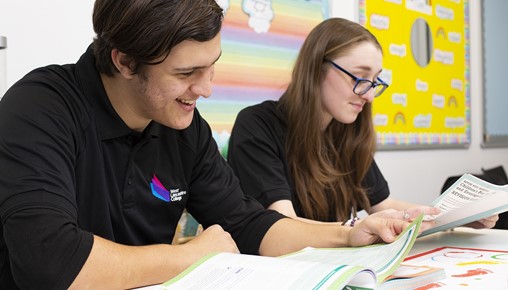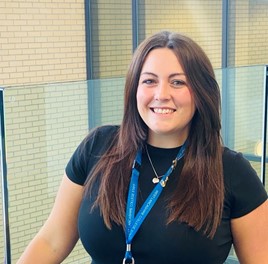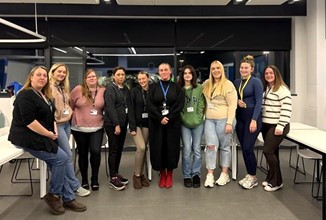

Early Years Education
Early Years Education is all about changing a child's life for the better and ensuring they get off to the best start in their education. Studies have shown that the most rapid period of brain development is from birth to the age of 8 and within that time, teachers influence their lives greatly.
Upon employment in our Early Years Education course, students will be taught by our experienced tutors, embark on enrichment trips, first aid training, careers event, plus much more.
Next Event
View our courses
Early Years Education at West Lancashire College

Contact our team
Meet our Early Years Education students and tutors

Kerri Clarke
Early Years Education LecturerI have great enthusiasm and passion for the Early Years Sector. I have a wealth of first-hand experience that can be passed down to our current students to enable them to succeed as an Early Years Practitioner.

Mell Watkins
Early Years Education LecturerI have worked at West Lancashire college since March 2010 and I’ve been a part of the Early Years and Education sector for many years. I gain great satisfaction in teaching our students and equipping them with the knowledge, skills, and behaviours to succeed and reach their full potential. I feel privileged to be able to meet such wonderful students and be part of their learning journey, it is incredible to observe how they grow and develop into competent Early Years and Education practitioners.

Megan Hall
Early Years Education LecturerI joined West Lancashire College in August 2024, with a strong passion to teach after being influenced by my own growing up. I studied Primary Education Early Years with QTS at Edge Hill University and specialised in Early Years. I embarked on a range of modules from birth to 7 year olds, as well as a SEND placement.

Ben
Early Years Practitioner Alumni StudentI chose West Lancashire College because it offered the course I wanted to take and is my local college. I have gained so much work experience on my programme and I am currently on placement at St Richard’s Primary School, which I love. My tutors are beyond amazing and have been so supportive. After I complete my course, I want to go on to study a BA in Primary Education with QTS.

Jess
Early Years Education Alumni StudentI chose West Lancashire College as it offered the course I wanted to take and was also my local college. I gained so much work experience on my programme and I really enjoyed my placement at St Richard’s Primary School. My tutors, Mell and Kerrie were beyond amazing and were so supportive. I have progressed onto studying Primary Education with QTS at Edge Hill University.

Caitlin
T Level Early Years Alumni StudentI chose to study the T Level Early Years Education course because I’ve always had a passion for working in the childcare sector. I have really enjoyed my placement as I’ve been able to put knowledge that I’ve learnt in college into practice.

Maddison
T Level Early Years Alumni StudentI chose to study the T Level Early Years Education course because I want to become a nursery teacher to help them develop. I’ve enjoyed my placement and the JJ Effect guest speaker was very inspirational.

Aimee
T Level Early Years Alumni StudentI chose to study the T Level Early Years Education course because I have an interest in the industry and really enjoyed my Year 10 placement in a nursery. I’ve loved the enrichment and creative activities.

Tia
T Level Early Years Alumni StudentI chose to study the T Level Early Years Education course because I would like to work with children in the future, either in a nursery or being a childminder/nanny. I enjoyed my placement as I find the practical side to be extremely fun and interesting.
What can I do with a qualification in Early Years Education?
Daily tasks:
- Assists with or plans and develops curriculum and rota of teaching duties.
- Discusses progress with student, parents and/or other education professionals.
- Supervises teaching assistants and trainees.
- Undertakes pastoral duties.
- Teaches simple songs and rhymes, reads stories and organises various activities to promote language, social and physical development.
- Supervises students and maintains classroom discipline.
- Maintains records of students.
- Prepares students for external examinations and administers and invigilates these examinations.
- Prepares, assigns and corrects exercises and examinations to record and evaluate students.
- Prepares and delivers courses and lessons in accordance with curriculum requirements and teaches a range of subjects.
Daily tasks:
- Discusses student.
- Updates and maintains students.
- Liaises with other professionals, such as social workers, speech and language therapists and educational psychologists.
- Supervises students in classroom and maintains discipline.
- Prepares, assigns and corrects exercises to record and evaluate students progress.
- Encourages the student to develop self-help skills to circumvent the limitations imposed by their disability.
- Develops and adapts conventional teaching methods to meet the individual student.
- Gives instruction, using techniques appropriate to the student.
- Assesses student.
- Creates a safe, stimulating and supportive learning environment for students.
Daily tasks:
- Coordinates and maintains quality assurance procedures.
- Assists with recruitment, public relations and marketing activities.
- Arranges for the preparation and publication of syllabuses and other official documents.
- Organises examinations, necessary invigilations and any security procedures required.
- Drafts and interprets regulations and deals with queries and complaints procedures.
- Acts as secretary to statutory and other bodies/committees associated with the educational establishment.
- Controls administrative aspects of student admission, registration and graduation.
- Leads or contributes to decision making processes regarding curricula, budgetary, disciplinary and other matters.
- Provides administrative support to the academic team.
- Arranges for evaluation of management, accounting, information storage and retrieval and other facilities.
Daily tasks:
- Communicates with parents and colleagues on children.
- Writes reports on children.
- Reads stories, organises counting games to help develop language and number skills.
- Plans and organises games and other activities and supervises children.
- Supervises young children at mealtimes.
- Baths, dresses, prepares feed for and feeds babies, changes babies clothing whenever necessary.
Daily tasks:
- Complies with regulations set by OFSTED and their inspection requirements.
- Maintains appropriate records of children.
- Takes older children to and from school.
- Takes children to participate in play groups or on appropriate outings.
- Provides, supervises and participates in children.
- Mends, washes and irons children.
- Plans, prepares and serves children.
- Changes babies.
- Assists children to wash and dress.
Daily tasks:
- Liaises with parents, carers and colleagues and keeps appropriate records.
- Puts away equipment and cleans premises after use.
- Organises and supervises children.
- Organises and supervises children on excursions.
- Encourages children.
- Provides play areas and prepares materials for a wide range of children.
- Supervises children.
Daily tasks:
- Helps with outings and other out-of-classroom activities.
- Makes simple teaching aids and constructs thematic displays of educational material or children.
- Assists children with washing or dressing for outdoor and similar activities.
- Listens to children read, reads to them or tells stories.
- Looks after lesson materials such as paper, pencils and crayons.
- Assists teacher with preparation or clearing up of classroom.
Daily tasks:
- Provides feedback to teachers and completes and maintains records.
- Attends to child.
- Helps and encourages child to communicate.
- Implements care programmes, as appropriate.
- Identifies signs of distress and offers reassurance.
- Helps child understand instruction through a variety of means and encourages self-confidence and independence.
- Supports schoolwork under teacher.
Daily tasks:
- Directs children to cross the road when safe.
- Signals approaching traffic to stop by using hand signals and school crossing signs.
- Waits for a safe gap in traffic and walks to the centre of road.
- Meets children wanting to cross the road and directs them to wait at the kerb.
- Assists young children with feeding, dressing, washing and toiletry activities.
- Cares for sick children and administers first aid if necessary.
- Supervises the playground activities of children during meal and break times.
Upcoming events



October Open Event
West Lancashire College
Monday 13th October 2025
4:30pm - 7:00pm


